No one is bigger than the EU
Adelina Marini, September 20, 2010
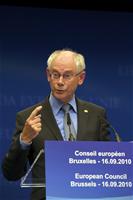 The European Commission's president Jose Manuel Barroso and the European Council president Herman van Rompuy will be the face and the voice of the common European foreign policy. This is the feeling that the press conference, after the end of the first European Council, dedicated on foreign policy, left. This feeling is due to the words of the Commission's president who said that it was necessary the Lisbon Treaty to be applied with "a culture of cooperation" among Member States and the European institutions", "so that those [the institutions] that represent the European Union, namely president van Rompuy and myself at a summit level and Cathy Ashton as a High Representative".
The European Commission's president Jose Manuel Barroso and the European Council president Herman van Rompuy will be the face and the voice of the common European foreign policy. This is the feeling that the press conference, after the end of the first European Council, dedicated on foreign policy, left. This feeling is due to the words of the Commission's president who said that it was necessary the Lisbon Treaty to be applied with "a culture of cooperation" among Member States and the European institutions", "so that those [the institutions] that represent the European Union, namely president van Rompuy and myself at a summit level and Cathy Ashton as a High Representative".
Moreover, President Herman van Rompuy explained that the key messages of 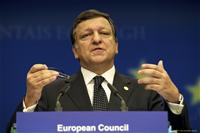 the Union would be mandated to the European Council but would be prepared and applied by the Foreign Affairs Council, the Commission and the High Representative. And as, according to van Rompuy, the defining of a common foreign policy is a process, the beginning of which has been put by the first European Council for the external policy (the first of many in a row), the President of the Commission added that from now on a major task would be identifying European interest which should not be in contradiction to national interests.
the Union would be mandated to the European Council but would be prepared and applied by the Foreign Affairs Council, the Commission and the High Representative. And as, according to van Rompuy, the defining of a common foreign policy is a process, the beginning of which has been put by the first European Council for the external policy (the first of many in a row), the President of the Commission added that from now on a major task would be identifying European interest which should not be in contradiction to national interests.
The wish of the two leaders, who will represent EU's external policy, is, aside from defining EU's strategic objectives, but also focusing on tactics.
How will this happen?
The main messages of the Union, meaning its wishes, will be supported by special negotiations and trade-offs. The key word will be reciprocity. Herman van Rompuy pointed out that reciprocity was not a dirty word and added that now we could talk of mutual interest too. "We all insist on deliverables and leverage. We have precise ideas on how to position ourselves vis-a-vis China, as reflected in the conclusions of the European Council and so, thanks to today's discussions, when the president of the European Commission and I meet the Chinese Prime Minister in Brussels three weeks from now we do not speak just for Brussels, we can speak on behalf of the 27".
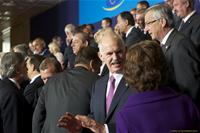 Actually, it is hard to define what exactly had provoked the EU and its leadership to focus on forging common foreign policy, at least in the areas of mutual interest of all 27 Member States. On the one hand, it has obviously been worked upon the application of the Lisbon Treaty which created the possibility for the establishment of the European External Action Service, headed by baroness Ashton. On the other hand, however, as Herman van Rompuy himself admits, Europe had started to realise that the economic power of the emerging countries is transforming into real political power. "The new players do not always share our interests and world views.", Rompuy added.
Actually, it is hard to define what exactly had provoked the EU and its leadership to focus on forging common foreign policy, at least in the areas of mutual interest of all 27 Member States. On the one hand, it has obviously been worked upon the application of the Lisbon Treaty which created the possibility for the establishment of the European External Action Service, headed by baroness Ashton. On the other hand, however, as Herman van Rompuy himself admits, Europe had started to realise that the economic power of the emerging countries is transforming into real political power. "The new players do not always share our interests and world views.", Rompuy added.
He also said that after he took office 8 months ago, during his tour around EU capitals (Sofia was one of his first legs in his list) he encountered frustration after the Copenhagen summit. The common feeling, he said, was that the EU had been sidelined. Against the background of this, the economic outlook a year ago was not very good in a moment when others around the world were growing rapidly.
The strategic partners
From the results of the summit it becomes clear that the Union's strategic partners will be the G20, the Middle East, the Western Balkans, the Eastern Partnership. By the way, here the Union has reached to another very important conclusion - the European global reputation starts with Europe's stability. "... if we want to be global players we have to be and we are regional players", Barroso said. This is why the Western Balkans and the countries of the Eastern Partnership will be of great importance to the EU.
The president of the Commission also announced that during the Council he 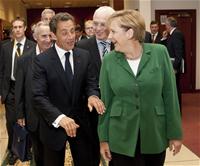 especially focused on trade, which is logical against the backdrop of the realisation that economic power always projects political influence. This autumn EU's executive is to present a communication on the development of a European trade strategy. With this regard, the approval of the first of its kind free trade agreement with South Korea was very timely. This document, according to Herman van Rompuy, will boost European economy and will contribute to the creation of new jobs.
especially focused on trade, which is logical against the backdrop of the realisation that economic power always projects political influence. This autumn EU's executive is to present a communication on the development of a European trade strategy. With this regard, the approval of the first of its kind free trade agreement with South Korea was very timely. This document, according to Herman van Rompuy, will boost European economy and will contribute to the creation of new jobs.
Obviously this will be the approach towards the other strategic partners. This type of free trade agreements are very similar to the American "special status of most favoured nation in the area of trade", providing special trade preferences. The agreement foresees both sides to eliminate 98.7% of duties for industry and agriculture in 5 years. The main objective of the agreement is gradual trade liberalisation between both sides and will be officially signed on October 6 during the EU-South Korea summit in Brussels, but will enter into force from July 1, 2011. South Korea is the eighth largest trade partner of the EU. Similar agreements are to be concluded with the other strategic partners of the EU.
No one is bigger than the EU
Jose Manuel Barroso made it clear that the EU had realised one more important thing, which so far used to remain far behind because of the internal institutional problems in the last 10 years. The change of global balance means that the EU can no longer lose its potential and influence. "The choice is not strong influence for member states and little influence for the European institutions or little influence for the member states and lots for the EU. The choice is whether we are strong together or weak separately. As one of the members of the Council highlighted, even the biggest member state of the EU is not so big as our most important strategic partners. But together the EU is the number one economy in the world".
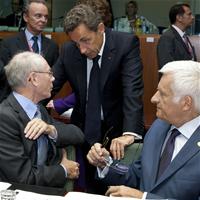 It is wonderful that finally the Union found the time to pay serious attention to its relations with the rest of the world. The problem, however, is whether the "beginning of this process" allows "the number one economy in the world" to act in the way, described above by its face and voice, namely - again to pass through the long and painful process of forming common interests through the Foreign Affairs Council, the Commission and the European Council. And one more thing, which remains still unclear so far - in what way the EU will identify the common European interest which is not in contradiction to the national ones?
It is wonderful that finally the Union found the time to pay serious attention to its relations with the rest of the world. The problem, however, is whether the "beginning of this process" allows "the number one economy in the world" to act in the way, described above by its face and voice, namely - again to pass through the long and painful process of forming common interests through the Foreign Affairs Council, the Commission and the European Council. And one more thing, which remains still unclear so far - in what way the EU will identify the common European interest which is not in contradiction to the national ones?
In spite of the lack of sufficiently clear answers to these questions, the good news is that, maybe, the White House administration is already aware whom to talk to - Herman van Rompuy and Jose Manuel Barroso. Even better is that gradually the big mechanism is starting to structure - the External Action Service which, under the cautious eye of both leaders, will prepare positions, which will then be passed through the Foreign Affairs Council and the leaders of the EU, and only then will come out of the mouths of Barroso and van Rompuy. It only remains this mechanism to start functioning in full motion in order for us to see where it is still creaking.
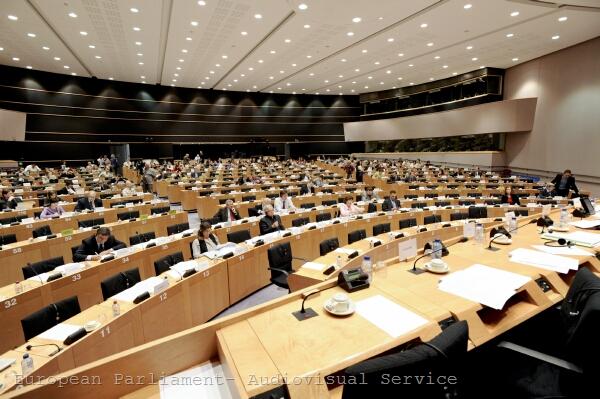 | © European Parliament- Audiovisual Service
| © European Parliament- Audiovisual Service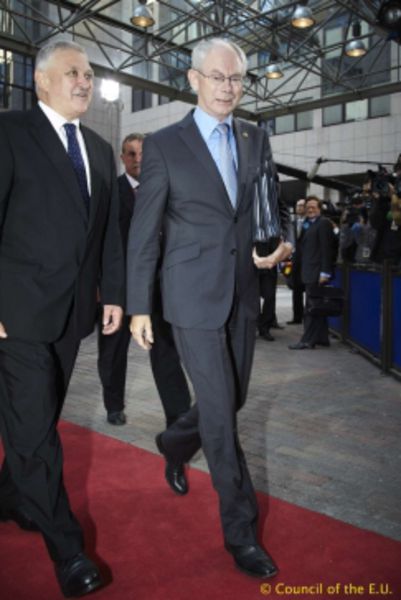 | © The Council of the European Union
| © The Council of the European Union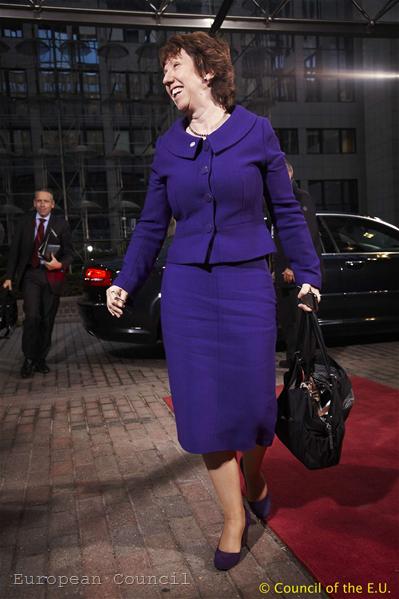 | © European Council
| © European Council